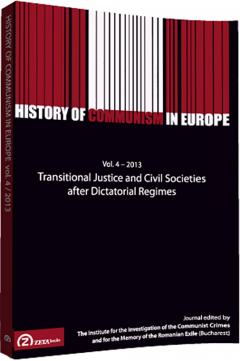
History of Communism in Europe: Vol. 4 / 2013
44.00 Lei · 1 ofertă
Salvează ca:
Salvată ca:
Salvează ca:
Salvată ca:
Cel mai mic preț
Titlu folosit de magazin
Preț
Magazin
History of Communism in Europe: Vol. 4 / 2013
Carturesti · În stoc
44.00 Lei
Istoricul prețului
Descriere
Table of Contents I. Argument Dalia BATHORY: Transitional Justice. Between Political Myth and Civil Society RealityAbstract: Transitional justice emerged as a working concept from the need to clarify the relationship between victims and perpetrators and the latters’ guilt, after the collapse of abusive regimes in Africa, Latin America and Eastern Europe. Since 1995 it has been defined in many ways, by many scholars, according either to its means and goals or to its actors. It has become a very broad concept, describing actions of justice, reparation, search for the truth and reform. While transitional justice policies should result in giving more coherence to a shuttered society, there are at least two threats that must be taken into consideration. One is to transform it into a political myth, by allowing the political factor to confiscate it, the other is to expand its area of concerns in order to cover aspects of daily social problems. The role of the civil society is very important to limit these threats, although what it is that we name “civil society” is still under scholarly debate. The analyses published in this issue of History of Communism in Europe cover these problems in their case studies which come from Latin America or the former Soviet bloc. Most of them stress on the very important role the grassroots actions of members of civil society have on “settling accounts” with the past, actions that seem to be born out of the inefficient “official” measures taken at state level. II. Transitional Justice – Practice and Theory Csaba VARGA: Transitional Justice. Philosophical Foundation and Constitutional Rejection in Hungary Abstract: There are internationally set criteria that apply in the case of a legacy of grave and systematic violations of human rights, generating obligations of the state towards the victims and society. They specify: (1) a right of the victim to see justice done, (2) a right to know the truth, (3) an entitlement to compensation and nonmonetary forms of restitution, as well as (4) a right to reorganized and accountable institutions. Facing the complete failure of implementing the first three points, one can claim that none of them has been fulfilled in Hungary since the fall of Communism, almost one quarter of a century ago. This paper analyses the context in which constitutional adjudication may confront certainty of law with the very idea of justice by putting an end to any progress of leaving the legacy of Communism behind. As a consequence, the Rule of Law becomes a mere simulacrum. III. Transitional Justice at Grassroots: Narrative as a Cure for the Broken Social Fabric Andreas HEMMING: Justice of another Kind. Laying Claims to the Past in Post-Dictatorial Albania Abstract: More than twenty years after the collapse of the totalitarian regime in Albania, the archives of the state security apparatus (Sigurimi) have yet to be opened. The horror of the Hoxha regime remains under lock and key. Not one word is lost on the network of political prisons and the state security apparatus...
Detalii
- Categorie
- Timp liber / Reviste si publicatii
- Autor
- Dalia Bathory, Various Authors
- Editura
- Zeta Books







